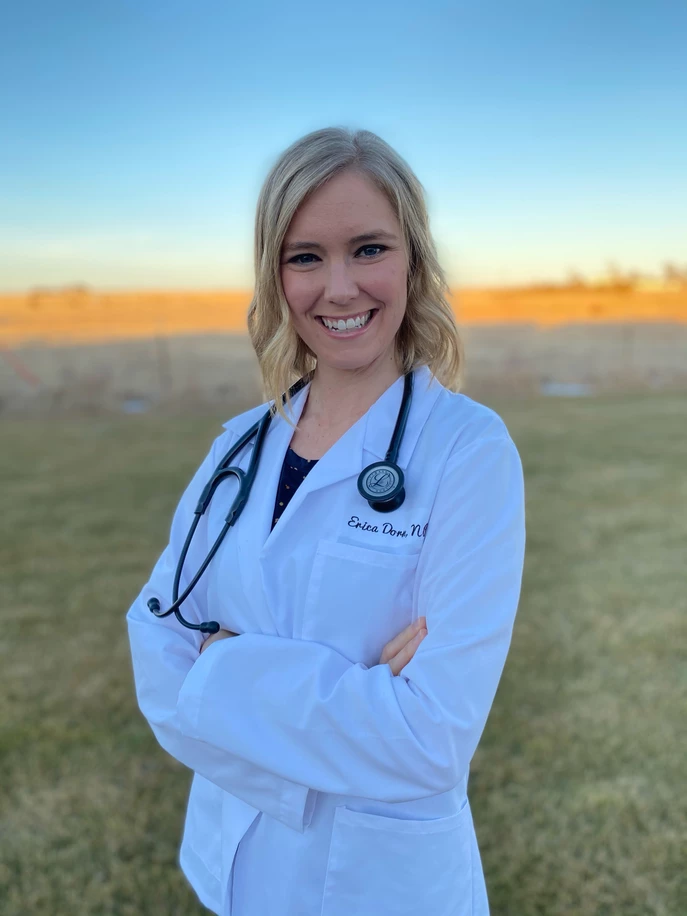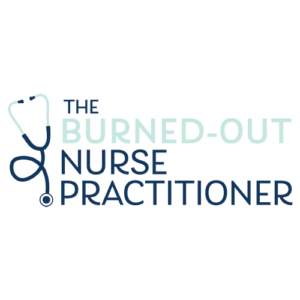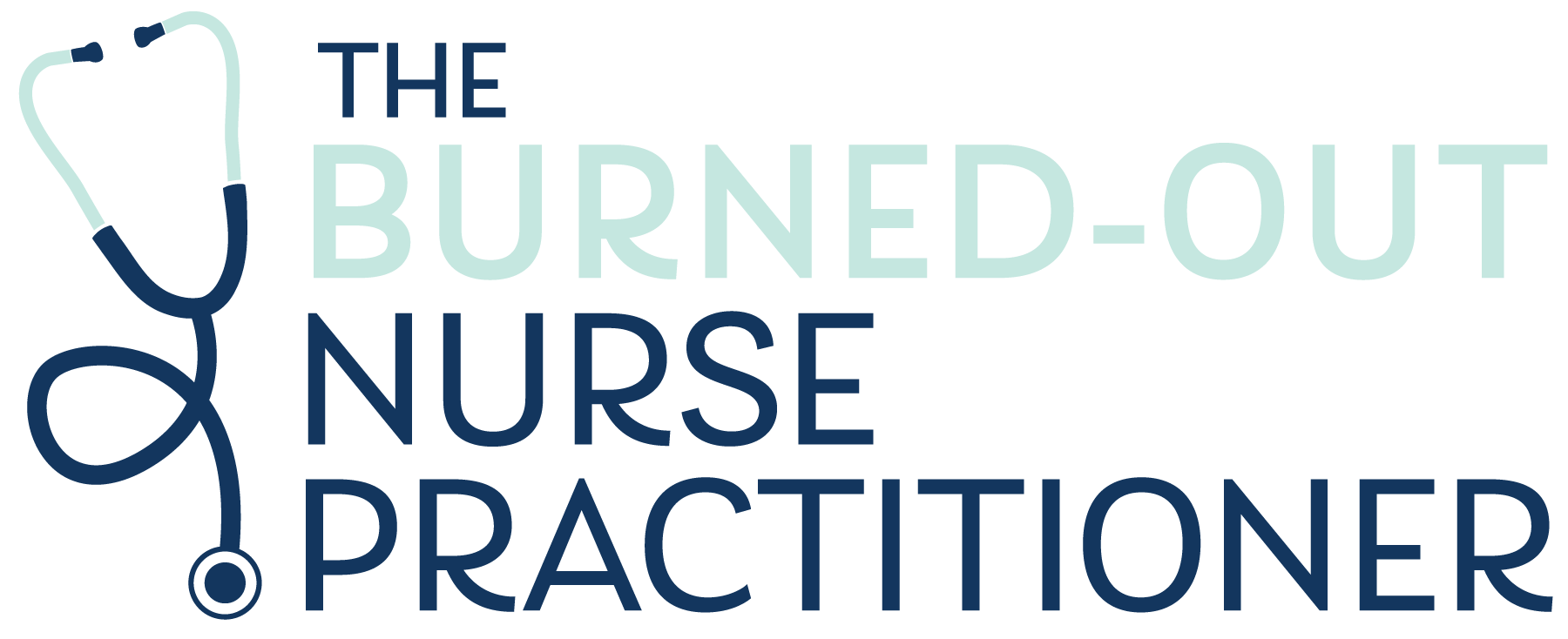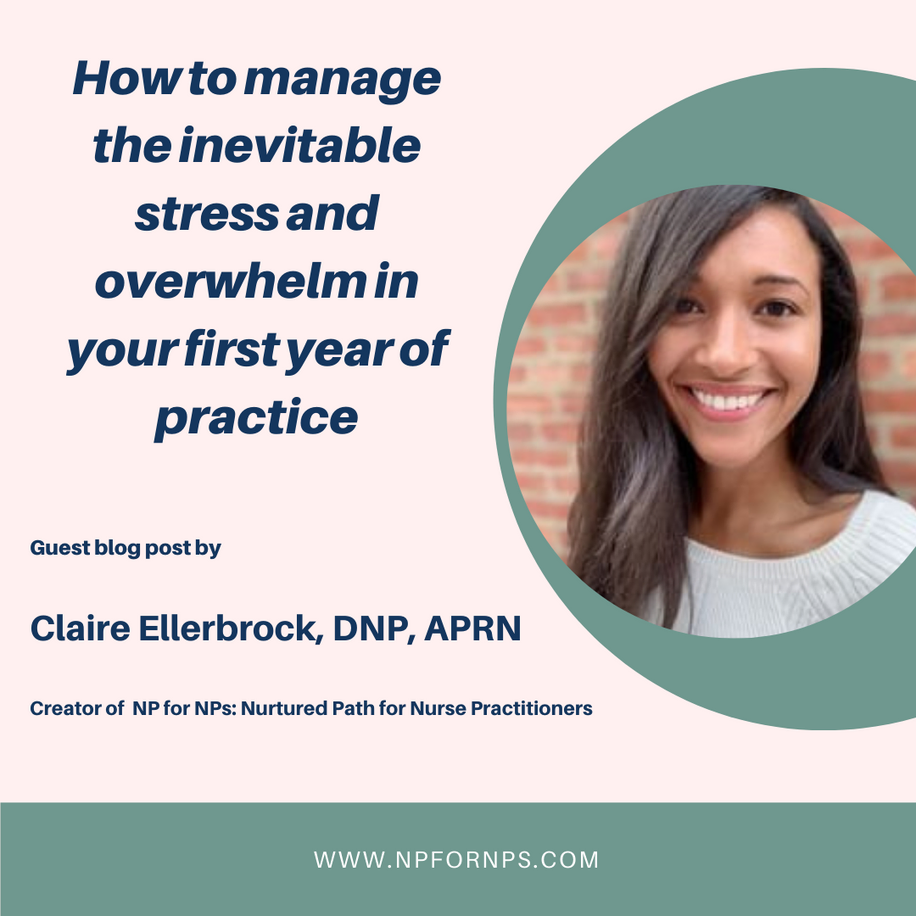Attention all new and/or overwhelmed nurse practitioners!
I am pleased to share this guest blog post with you! Written by Claire Ellerbrock, DNP, MSN, APRN, who is the creator of NP for NPs: Nurtured Path for Nurse Practitioners. Claire specializes in helping new nurse practitioners move from unsure to unstoppable.
Here is Claire’s guest blog post….. enjoy!
How to manage the inevitable stress and overwhelm in your first year of practice
Heading into school to become a nurse practitioner, I wasn’t sure what to expect, but I liked the idea of helping people in a way where I was directly responsible for the patient I was serving. I had imagined that I would help a patient who would feel eternally grateful, and that gratitude would fuel me every day.
When I graduated, I had so many aspirations as a new NP that the stress of being a floor nurse would be a distant whisper as a great salary, lower stress, and meaningful patient interactions would be the norm.
I quickly realized that I was a bit off on this aspiration of lower stress. Ok, way off. My first few weeks and months as an NP were stressful and overwhelming. I felt incredibly nervous each morning on my drive to work. I was often restless at work seeing patient after patient each day and started feeling as though I was chained to my desk and beholden to the receptionist who scheduled my patients each day. I was completely alone without a support network. No one to ask questions to when I was unsure how to prescribe a medication or handle a patient escalating in my office.
I was acutely aware that I was solely responsible for my patients, and this terrified me. While I had negotiated a good salary when offered this first NP job, over time, I came to feel that the workload and importance of the work I was doing were far higher than the salary I had initially negotiated. I felt my soul quieting a bit each day as I started to feel drained by the workload and number of patients I saw each day who were each wildly more complex than the previous patient. It was exhausting feeling constantly alone and unsupported in my role as a brand-new nurse practitioner. I was frightened, always.
Luckily, some things got better over time. I figured out how to create a support network on my own. I learned to carve out more time for myself in creative ways. And after a few months, I began to feel more confident and competent in my role.
I realized that learning to anticipate stress before entering practice as a new NP is an excellent way to manage overwhelm, so it doesn’t overtake you when you start.
Time management
It’s important to know what the most common contributors to stress are to address them proactively. One primary stressor for any NP, particularly new NPs, is time. Not having enough time to document, critically think to formulate plans, and follow up on important communications with staff and other providers.
Obviously, time is finite so getting creative with getting more of it is important. The best way to increase your time when you’re new is to come to work 20 to 30 minutes early. During this time, you’re not “on the clock.” You can spend this time getting organized for the day and do things like:
- Review your schedule and caseload.
- Look over patient histories to familiarize yourself with the patients you will be seeing.
- Catch up on phone calls or emails so you’re not feeling bombarded through the day with all the additional tasks you will need to complete.
Another way to manage your time effectively is to talk to your support staff to create a workflow that works for everyone. Let’s say you work in an outpatient clinic, and you most closely work with a medical assistant and receptionist who schedules your patients. You decide that you’d like to have the medical assistant see the patient briefly first and then bring them to your office. Also, after seeing the patient, you want 4 to 5 minutes to finish charting so that you aren’t bogged down by all the notes you must complete at the end of your day. If this workflow allows you to utilize your time best, communicate this to your team. No one’s a mind reader, and you might not even know what works best, so talk to your team to see what workflow could create the most efficiency.
Create a support network
Lack of support is another area of stress for many new nurse practitioners. We feel supported for the most part while in school and during our practicum hours, but then once we graduate and start working, the support severely drops off. We’re left with questions like,
- At what point do I worry about lab values that are out of range?
- How do I say ‘no’ to patients pressing me for controlled substances when I don’t feel it’s appropriate to prescribe?
- What are the best ways to chart efficiently but with enough clarity?
So many questions creep up when you start in practice that doesn’t necessarily come to mind when you’re an NP student. Creating a support network of experienced clinicians can help overcome the stress you’ll experience in the beginning.
How do you create this magical support network?
There are a few ways to build in support. During the interview process, it’s important to ask about structured time each week to meet with a collaborating provider to review questions and patient cases. Asking for this protected time to learn helps increase your confidence and competence early on. You might also live in a state requiring a collaborating provider whom you meet with regularly to review cases; make sure you utilize this relationship effectively.
If you aren’t afforded the opportunity to meet regularly with an experienced provider, you can still create a support network through private supervision with a knowledgeable clinician. Private supervision is a structured, regularly occurring meeting during which you meet with an experienced physician or NP to review difficult patient cases. Private supervision is something you can seek out on your own and often costs money, but the value far outweighs the potential cost.
See this article to learn more about why every new NP should be doing private supervision.
Getting creative with ways to maximize your time and cultivating a support network will significantly help you transition into practice and feel less stressed along the way. You will make it through the journey and come out feeling more confident and self-assured on the other side.
Claire Ellerbrock, DNP, MSN, APRN, is a Nurse Practitioner and coach based in Ohio. She is the founder of NP for NPs: Nurtured Path for Nurse Practitioners. Learn more at www.NPforNPs.com or email her at contact@npfornps.com.

For time management and charting tips, check out The Nurse Practitioner Charting School– The one stop for all documentation resources created specifically for nurse practitioners. Learn more at www.npchartingschool.com

**Full disclosure, this blog post may include affiliate links. I do receive a commission if any of the affiliate programs/services/supplies are purchased. This is at no extra cost to you but does allow me to continue to provide content as The Burned-out Nurse Practitioner! Thank you!

**Full disclosure, this blog post may include affiliate links. I do receive a commission if any of the affiliate programs/services/supplies are purchased. This is at no extra cost to you but does allow me to continue to provide content as The Burned-out Nurse Practitioner! Thank you!




